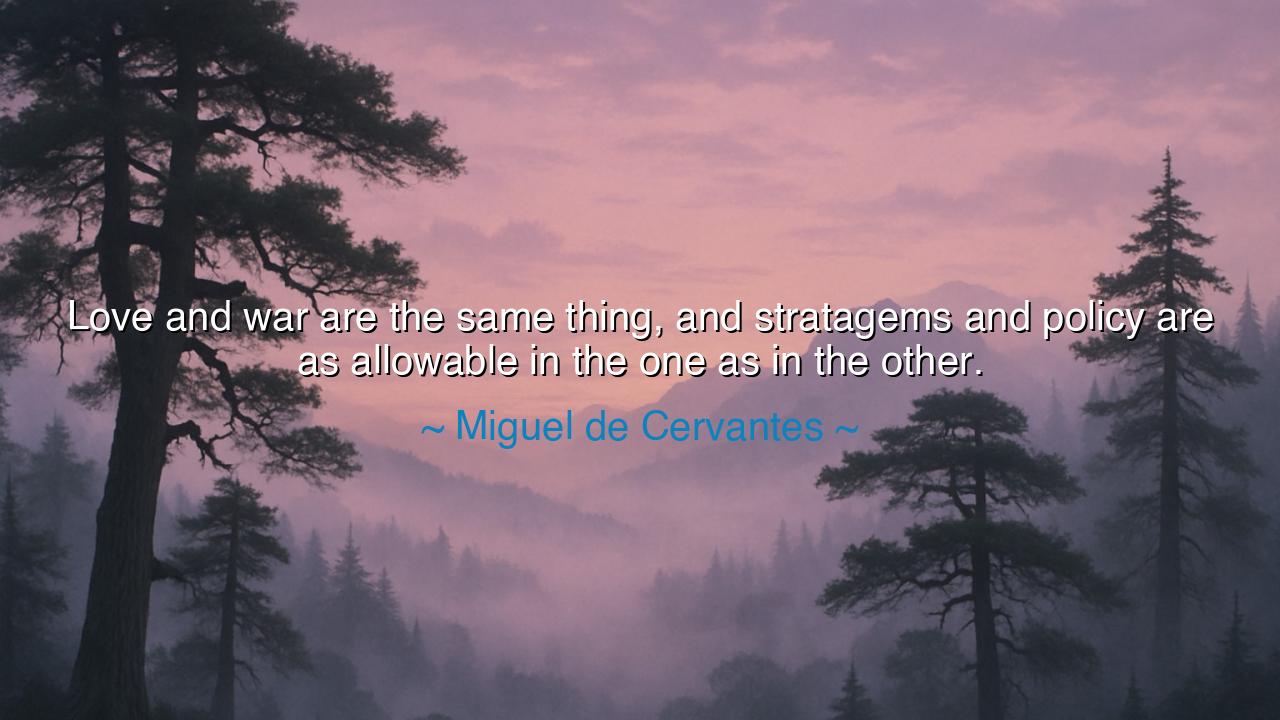
Love and war are the same thing, and stratagems and policy are
Love and war are the same thing, and stratagems and policy are as allowable in the one as in the other.






Hear, O seeker of wisdom, the words of Miguel de Cervantes, that great knight of the pen who captured the heart of Spain with his immortal tale: “Love and war are the same thing, and stratagems and policy are as allowable in the one as in the other.” With this saying he revealed a truth both sharp and tender—that the battlefield of the heart is no gentler than the field of arms, and that both demand cunning, perseverance, and courage. Though one slays with steel and the other conquers with desire, the essence of the struggle is the same.
For what is love if not a campaign of the soul? The lover lays siege to the heart of the beloved, not always with brute force but with guile, with patience, with a thousand subtle gestures. Words become arrows, glances become lances, and silence itself becomes a weapon. Just as in war, one does not always advance in straight lines; sometimes the path is curved, sometimes retreat is but a feint to prepare for a greater victory. Cervantes, who had seen war with his own eyes as a soldier at Lepanto, understood this well: the strategies of conquest do not end on the battlefield—they echo in the chambers of the heart.
Consider the story of Paris and Helen, whose tale ignited the great Trojan War. Paris did not win Helen by arms alone; he used the stratagem of persuasion, the sweet cloak of charm and promise, to draw her away from Sparta. And when she followed him to Troy, the world itself was plunged into a war that endured ten long years. Thus, in one tale, we see both sides of Cervantes’ truth—love as war, and war as love, with each demanding both policy and passion.
Nor is this truth confined to myth alone. In history, recall how the great Julius Caesar wooed Cleopatra. Their union was not born merely of affection, but of political vision and careful maneuvering. Each saw in the other a chance to secure power, and so their hearts became allies as much as their swords. Was this not the union of love and war, where tenderness and ambition marched hand in hand? The world was changed by their embrace, as surely as by their armies.
Yet, let no soul be deceived: to speak of stratagems in love is not to counsel deceit, but wisdom. Just as a general plans his battle with foresight, so too must the lover approach with care, with patience, with understanding of the beloved’s heart. Impetuous charge may lead to ruin, but a well-laid plan—whether in love or in war—can win the fortress without needless destruction. To act with policy is not to betray sincerity, but to honor the gravity of the struggle.
What lesson, then, shall we take from the knight Cervantes? It is this: in both love and war, passion without prudence is folly. Courage must be tempered with cunning; desire must be guided by discipline. The heart, like a kingdom, must be approached with respect and strategy. He who rushes blindly may be defeated, but he who balances fire with foresight shall prevail.
So I say to you, O listener: when you love, do not think it enough to burn with feeling. Study, understand, prepare. Show patience when impatience beckons, kindness when anger tempts you, silence when words would betray you. And when you must act, act with the boldness of a warrior striking at dawn. For as Cervantes taught, love and war are the same thing—and both yield their treasures only to those who are brave enough to fight, and wise enough to plan.






DNDuong Nguyen
Cervantes’ idea that love and war are governed by the same rules is both unsettling and captivating. It implies that emotions, whether romantic or combative, can justify manipulation and deceit. But is that an excuse or an observation? Perhaps he’s suggesting that human behavior is inherently strategic, even when driven by emotion. It makes me reflect on how thin the line really is between passion and conflict.
GDGold D.dragon
There’s something almost ironic about Cervantes equating love and war. Both can consume people entirely, pushing them to act irrationally. But in saying that the same tactics apply to both, is he warning us or simply observing human nature? It makes me think about how often love stories mirror battles—of pride, ego, and control. Maybe the real lesson here is that both love and war test who we truly are.
ADANH DUC
I find this quote intriguing because it blurs the boundary between two powerful forces—love and war. If strategy and policy are allowed in both, does that mean manipulation and calculation are acceptable in romance? Or is Cervantes simply acknowledging that human behavior, whether in battle or love, is driven by similar instincts—desire, control, and survival? It makes me question whether genuine love can exist without some form of strategy.
KPNguyen khac phan
Cervantes’ words make me wonder if love and war truly share the same rules. Both can lead to triumph or destruction, and both require courage and risk. But in love, isn’t honesty and vulnerability more powerful than strategy? Maybe Cervantes is pointing out that even in love, we sometimes play games to protect ourselves or gain advantage. It’s unsettling but perhaps uncomfortably true about human relationships.
DLPhạm Diẹu Linh
This quote makes me think about how love and war both bring out intense emotions—desire, jealousy, fear, and pride. Cervantes seems to say that in both, people justify all tactics to achieve their goals. But should we really accept deception and strategy as natural in love? Or does this mindset turn relationships into competitions instead of partnerships? It’s a provocative thought about the moral limits of passion and ambition.